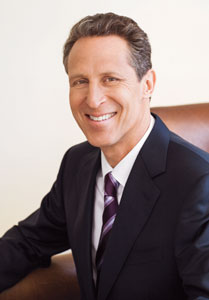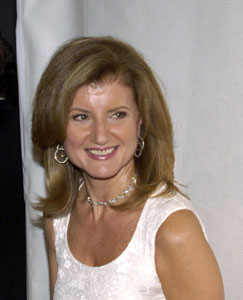Author One-on-One: Arianna Huffington and Mark Hyman
Arianna Huffington and Mark Hyman discuss Arianna's new book Thrive: The Third Metric to Redefining Success and Creating a Life of Well-Being, Wisdom, and Wonder.
Arianna Huffington
is the chair, president, and editor-in-chief of the Huffington Post
Media Group, a nationally syndicated columnist, and author of fourteen
books. Mark Hyman, MD is a seven-time New York Times bestselling author—Including the recently released Blood Sugar Solution 10-Day Detox Diet—founder
and medical director of The UltraWellness Center in Lenox,
Massachusetts and Chairman of The Institute for Functional Medicine.
Mark Hyman: Arianna, in
Thrive
you talk about our need to redefine success beyond money and power to
include what success means to us and that to live a truly successful
life we need to integrate well-being, wisdom, wonder, and giving into
our lives. You open the book describing your collapse in 2007 from
exhaustion leading to a broken cheekbone and a round of visits to
doctors and hospitals for tests. You were clearly running on empty, as I
know so many people are—tell us about that experience and how it led to
your larger wake-up call in terms of health and well-being.
Arianna Huffington:
I had my personal wake-up call on April 6, 2007, when I found myself on
the floor in a pool of blood. I had collapsed from exhaustion, breaking
my cheekbone and cutting my eye. I was working eighteen-hour days to
build The Huffington Post, while being a mom to my two teenage
daughters. What this wake-up call taught me was that even though I was
considered successful by our society's conventional measures of success,
I was not living a successful life by any sane definition of success.
Something had to radically change in my life.
As I've learned
firsthand, overwork, stress, and sleep deprivation have profound effects
on virtually every part of our lives. Our current model of success is
not working for anyone. It’s not working for women, and really, it's not
working for men either.
Mark Hyman: All so true. Stress
really does impact your physical well-being, which is why I loved your
discussion of the power of meditation in our lives to relieve stress and
bring balance. You make the point that even a brief meditative moment
can have a restorative effect. Tell us more about that and your daily
practice.
Arianna Huffington: There is more and more
scientific evidence about the impact of mindfulness and meditation in
our lives. The list of all the conditions that these practices impact
for the better—depression, anxiety, heart disease, memory, aging,
creativity—sounds like a label on snake oil from the 19th century!
Except this cure-all is real, and there are no toxic side effects.
Indeed, 2013 was the year when meditation and mindfulness finally and
overwhelmingly stopped being seen as something vaguely flaky, vaguely
New Age-y, definitely California, and fully entered the mainstream.
I
personally start every morning with at least 20 to 30 minutes of
meditation. If you're just beginning, you can start by introducing 5
minutes of meditation into your day. Even just a few minutes will open
the door to creating a new habit—and all the many proven benefits it
brings.
Mark Hyman: Throughout the book you caution
against the dangers of living in a permanently connected state. I agree
that it is a growing problem in society today. I know over Christmas you
participated in a digital detox yourself. Is it truly possible to
disconnect, even when you are running the biggest online news site in
the world?
Arianna Huffington: I'm happy to say that
yes, it is possible! I spent the week between Christmas and New Year’s
in Hawaii with my daughters, my sister, and my ex-husband—with no TV and
no social media. Almost immediately, I was floored by the realization
of just how much my phones had become almost physical extensions of
myself—I would instinctively reach for them like phantom limbs!
Unplugging meant rediscovering and savoring the moment for its own sake.
Which is to say, taking in a view without tweeting it. Eating a meal
without Instagramming it. Hearing my daughters say something hilarious
and very shareable without sharing it. The unplugged version of myself
was better able to give these things my full attention. And when I came
back to the office, I was truly refreshed.
Mark Hyman: All important points. What do you want to see readers take away from this book?
Arianna Huffington:
In the book, I pull together three threads: my personal journey and my
hard-earned lessons; scientific studies about the importance of slowing
down, sleep, meditation, and disconnecting from our devices; and many
daily practices, tools, and techniques that can begin to transform our
lives.
I very much hope that the book will chart another way
forward—a way available to all of us right now, wherever we find
ourselves. A way based on the timeless truth that life is shaped from
the inside out—a truth that has been celebrated by spiritual teachers,
poets, and philosophers throughout the ages, and has now been validated
by modern science.
So I very much hope that the book will help
make room in our definition of success for well-being, wisdom, wonder,
and giving, and help us move from knowing what we need to do to actually
doing it.
======================================================================
Greg: What was the genesis for the book Thrive?
Arianna: We founded
The Huffington Post in 2005, and two years in we were growing at an incredible pace. I was on the cover of magazines and had been chosen by
Time
as one of the world’s 100 Most Influential People. But after my fall, I
had to ask myself, "Was this what success looked like? Was this the
life I wanted?" I was working eighteen hours a day, seven days a week,
trying to build a business, expand our coverage, and bring in investors.
But my life, I realized, was out of control. In terms of the
traditional measures of success, which focus on money and power, I was
very successful. But I was not living a successful life by any sane
definition of success. I knew something had to radically change. I could
not go on that way. And that is how
Thrive came to be.
Greg: How did we get here? As a society I mean: what are the greater forces at play?
Arianna:
Over time our society’s notion of success has been reduced to money and
power. In fact, at this point, success, money, and power have
practically become synonymous in the minds of many. This idea of success
can work— or at least appear to work— in the short term. But over the
long term, money and power by themselves are like a two-legged stool—
you can balance on them for a while, but eventually you’re going to
topple over. And more and more people— very successful people— are
toppling over.
In the world of business, one of the primary
obstacles keeping many companies from adopting more sane and sustainable
metrics of success is the stubborn — and dangerously wrongheaded— myth
that there is a trade- off between high performance at work and taking
care of ourselves. This couldn’t be less true. And soon, the companies
that still believe this will be in the minority. Right now, about 35
percent of large and midsize U.S. employers offer some sort of
stress-reduction program, including Target, Apple, Nike, and Procter
& Gamble. And those that do are starting to be recognized for their
efforts, especially by employees. Glassdoor.com, the social jobs and
careers community, releases an annual list of the top twenty- five
companies for work- life balance: “Companies that make sincere efforts
to recognize employees’ lives outside of the office,” said Glassdoor’s
Rusty Rueff, “will often see the payoff when it comes to recruiting and
retaining top talent.”
Greg: What is the most interesting research you came across in writing this book? Something which made you say, "Wow!"
Arianna:
One point that really struck me had to do with gazelles. They run and
flee when there is a danger— a leopard or a lion approaching— but as
soon as the danger passes, they stop and go back to grazing peacefully
without a care in the world. But human beings cannot distinguish between
real dangers and imagined ones. As Mark Williams, a psychology
professor at Oxford, explains, “The brain’s alarm signals start to be
triggered not only by the current scare, but by past threats and future
worries…So when we humans bring to mind other threats and losses, as
well as the current scenario, our bodies’ fight-or-flight systems do not
switch off when the danger is past. Unlike the gazelles, we don’t stop
running.” Now my screensaver is a picture of gazelles – they are my role
models! But
Thrive explores many of the ways modern science is validating ancient wisdom, so there were a lot of “wow” moments!
Greg: What are 3 things people can do (or deliberately not do) to make the shift to thriving?
Arianna:
Thrive
is designed as a bridge,to help us move from knowing what to do to
actually doing it. Here are three simple steps each of us can take that
can have dramatic effects on our well-being:
1. Unless you are one
of the wise few who already gets all the rest you need, you have an
opportunity to immediately improve your health, creativity,
productivity, and sense of well- being. Start by getting just thirty
minutes more sleep than you are getting now. The easiest way is to go to
bed earlier, but you could also take a short nap during the day— or a
combination of both.
2. Introduce five minutes of meditation into
your day. Eventually, you can build up to fifteen or twenty minutes a
day (or more), but even just a few minutes will open the door to
creating a new habit— and all the many proven benefits it brings.
3.
At the end of each day, let go of something that you no longer need—
something that is draining your energy without benefiting you or anyone
you love. It could be resentments, negative self-talk, or a project you
know you are not really going to complete.
Greg: Big question here and a bit of a shift, what do you want your eulogy to say?
Arianna: What I know for sure is that our eulogies have nothing to do with our resumes. Even for those who die with amazing
Wikipedia entries,
whose lives were synonymous with accomplishment and achievement, their
eulogies focus mostly on what they did when they weren’t achieving and
succeeding. They aren’t bound by our current, broken definition of
success. Have you ever heard anyone eulogized by saying, "George was
amazing. He increased market share by one-third!"?























